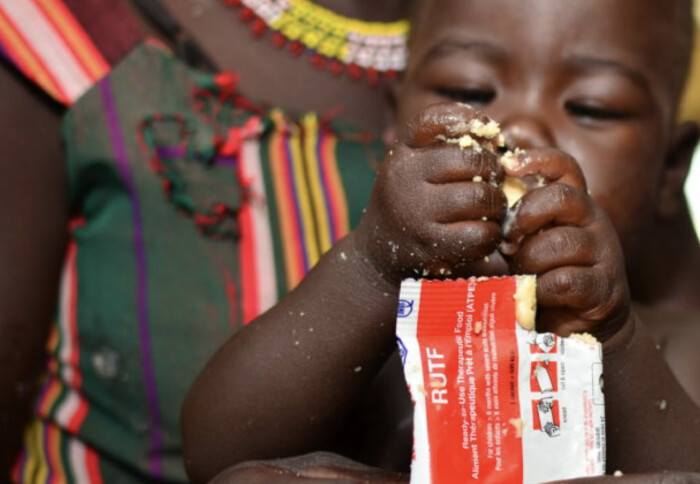New research gives insights into impact of nutrition on children with pneumonia

African child receiving Ready-to-Use Therapeutic Food (RUTF). Credits: Reco Industries
First study on nutritional supplementation in African children with severe pneumonia showed no added benefits
New research from the Institute of Global Health Innovation (IGHI)’s Centre of African Research and Engagement (ICCARE) provided insights into the efficacy of a nutritional supplementation regime in improving outcomes for children with severe pneumonia in Uganda and Kenya. The study, published in eClinicalMedicine Part of The Lancet Discovery Science Journal, is the first evidence of this kind.
The COAST-Nutrition study, a phase 2 randomised controlled trial, tested whether supplementing the usual diet with a nutritional feed developed for treating malnutrition would meet additional nutritional requirements and improve survival in African children with severe pneumonia.
The study did not demonstrate improved outcomes but paved the way for valuable lessons and future research.
How the COAST-Nutrition study came about
Links between severe pneumonia and malnutrition
Severe pneumonia remains the leading cause of illness and hospital admission in children in Africa. Metabolic requirements are high during severe pneumonia which results in breakdown of vital tissues (especially muscle) to release additional nutrients to these demands.
Early nutritional support is commonly practiced including in patients with severe pneumonia worldwide, however, currently there are no recommendations for nutritional support for African children with severe pneumonia.
The existing evidence has largely been limited to micronutrient supplementation with no overall benefit. No such study was conducted in low-income and middle-income countries. Therefore, ICCARE researchers aimed to change that by taking measurements of the physical growth and survival rates of children with severe pneumonia, thus gathering early data to support future guidelines for nutritional support in Africa.
Hypothesis and rationale behind the study
Researchers believed that a widely used Ready-to-Use Therapeutic Food (RUTF), particularly a peanut-based paste, could be rapidly deployed for nutritional support after pneumonia admission, if proven beneficial for children.

They hypothesised that children hospitalised with severe pneumonia, including children with different levels of nutritional status could potentially benefit from supplementary feeds with RUTF. They thought these feeds would provide additional energy-rich, protein, fat, and micronutrients to help meet their nutritional needs and improve global outcomes.
COAST-Nutrition study finding
The COAST-Nutrition trial was conducted in five sites in two countries in Africa. Researchers recruited 846 children hospitalised with severe pneumonia in Uganda and Kenya. They tested whether supplementing their usual diet with RUTF, developed for treating malnutrition, for 56 days would improve outcomes compared to children who only received their usual diet.
In this study, supplementing the usual diet with RUTF nutritional paste iof children aged 6 months to 12 years showed no benefits in terms of markers of muscle mass or mortality rates at Day 90 compared to usual diet alone. However, there was a marginal increase in skin fold thickness (indicative of fat mass gain) at Day 28 in the interventional group, but no improvements were observed in any anthropometric measure.
Another finding was an increase in adverse events to Day 180 (death and readmission) in the intervention arm, but these were not significantly greater than in the control arm, indicating that it might have been a chance result.
Future perspectives
Professor Kathryn Maitland, Director of the ICCARE Centre and study leader, said: "Although this study did not show specific improved outcomes for this type of nutritional support in African children recovering from severe pneumonia, it paves the way for future research in this area".
The COAST Nutrition research group recommend that future trials of nutritional support following pneumonia should focus on the high-risk undernourished group and use feeds designed to target the metabolic needs of children with severe infection to optimise outcomes.
Additionally, the composition of nutritional supplementation should be carefully considered, to include safety and efficacy in the acute and recovery phases of illnesses.
This project is part of the EDCTP2 programme (grant number RIA-2016S-1636-COAST-Nutrition) supported by the European Union, and UK Joint Global Health Trials scheme: Medical Research Council, Department for International Development, Wellcome Trust (grant number MR/L004364/1, UK).
Article text (excluding photos or graphics) © Imperial College London.
Photos and graphics subject to third party copyright used with permission or © Imperial College London.
Reporter
Dr Laura-Maria Horga
Institute of Global Health Innovation